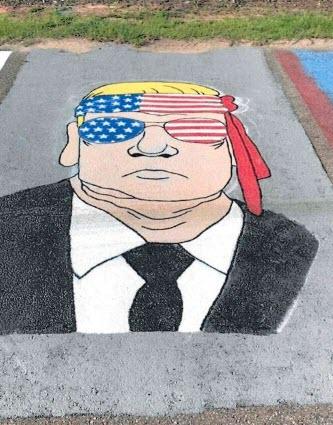Federal Court Rules Against Louisiana High School After Painting Over Student's Trump Mural Tyler Durden Tue, 10/13/2020 - 10:47
Authored by Jonathan Turley,
Many of us in the free speech community have long complained that the 1969 case of Tinker v. Des Moines Independent Community School District is often dismissed in cases addressing the free speech rights of students. The famous decision declared that students “do not shed their constitutional rights to freedom of speech or expression at the schoolhouse gate.”
Yet, courts have regularly curtailed free speech rights in deference to school officials maintaining discipline and order in their schools, even in the regulation of speech outside of schools. One rare victory emerged this week in Louisiana where a federal judge ruled that Superintendent Frances Varnado and Washington Parish School District board violated the rights of a high school senior by painting over his mural of President Donald Trump. U.S. District Judge Eldon Fallon relied on Tinker and declared the mural to be protected political speech.
Seniors at Pine Junior-Senior High School can pay $25 for an assigned parking spot and paint the spot as they deem fit, so long as the painting does not include profanity, lewd images and other students’ names. Ned Thomas painted an image of President Trump donned in stars and stripes sunglasses and a bandana.
Superintendent Varnado and the school board declared the mural “too political” and ordered it painted over.
Varnado insisted that she was merely trying to “to avoid controversy, not stir it up.” Of course, many crackdowns on free speech are justified as an effort to avoid controversy or unrest. Thomas said that he was given no chance to contest the decision and that the mural was painted over ten minutes after he received a call from the school.
The case is a classic example of how school officials have become emboldened in acts of censorship and speech regulation. We have been discussing the alarming rise of speech limitations and sanctions imposed by school officials. We have seen a steady erosion of the free speech rights of students in the last decade. The Supreme Court accelerated that trend in its Morse decision. Former JDHS Principal Deb Morse suspended a student in 2002 during the Olympic Torch Relay for holding up a 14-foot banner across from the high school that read “Bong Hits 4 Jesus.” The case ultimately led to the Supreme Court which ruled in Morse v. Frederick ruling in 2007 for the Board — a decision that I strongly disagreed with and one that has encouraged over-reaching by school officials into protected areas. Cheerleaders are expected to conform their free speech to accept positions or risk removal from their teams and even liking images on social media can get students suspended.
Fallon’s decision is a refreshing endorsement of the free speech rights of high school students. Fallon held:
The parties do not dispute that Tinker governs this case.
The painting of President Trump cannot reasonably be described as obscene or plainly offensive on its face, nor can it be construed as school-sponsored speech. The Court concludes that N.T.’s portrait constitutes pure political speech under the fourth category. Accordingly, the school’s actions will be analyzed under the framework that student speech cannot be restricted on the basis of viewpoint “unless there is a showing of material and substantial disruption.”
...
N.T.’s painting, while it is certainly a stylized and colorful image, depicts the sitting President of the United States. This is not a case involving a symbol such as a Confederate flag, which has an established meaning as a “symbol of racism and intolerance, regardless of whatever other meanings may be associated with it.” A.M. ex rel. McAllum v. Cash, 585 F.3d 214, 224 (5th Cir. 2009). Moreover, the painting conforms with all Pine Sr. High School rules regarding senior parking spots. In fact, the student obtained the Principal’s approval before the parking spot was ever painted. Because the Washington Parish School Board opened its schools for student speech by enacting its “Senior Paint Your Parking Space” policy, the First Amendment requires that students be allowed to express their political views freely, absent any conflict with school guidelines.
N.T. stated that he intended the painting to reflect his support for the President’s re-election campaign. Had N.T. worn a Trump lapel pin or displayed a Trump bumper sticker on his car, surely this would have amounted to political speech protected under the First Amendment. The Court sees no difference between those acts of expression and N.T.’s painting at issue here.
Bravo.
http://dlvr.it/RjWPf2

No comments:
Post a Comment